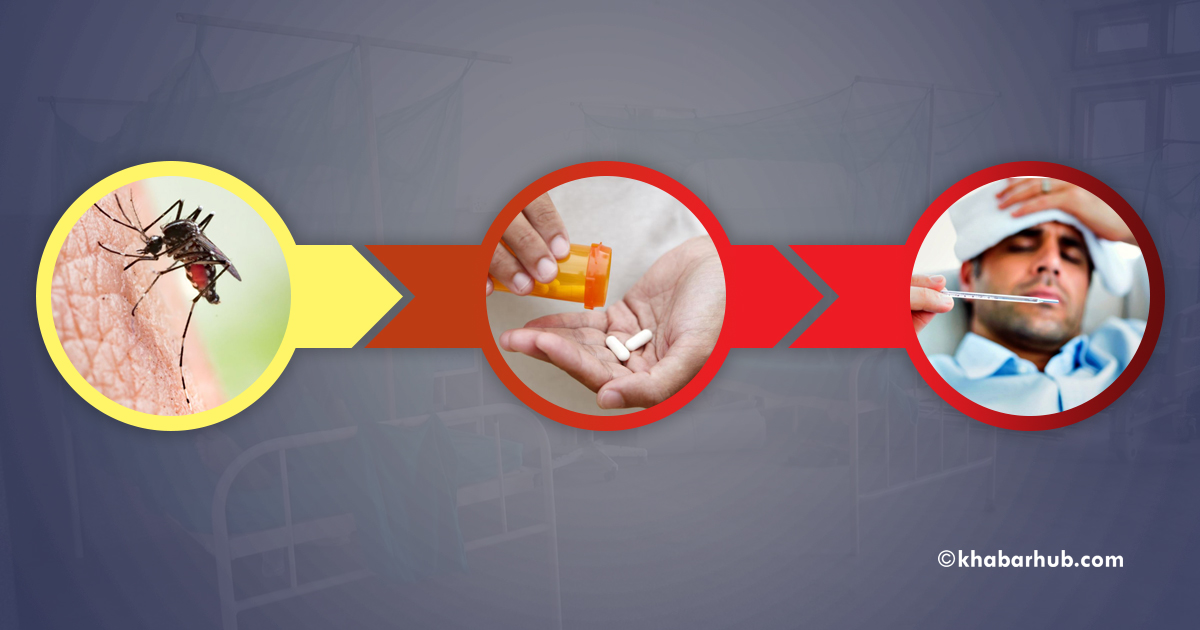0%

KATHMANDU: With dengue outburst in the country, suspected dengue patients — both adults and children – have been flooding into the hospital across the country, Khabarhub found on a visit to hospitals in Kathmandu.
The number of dengue patients is likely to sky-rocket.
At the Sukreraj Tropical and Infectious Disease Hospital at Teku, doctors and nurses are making tremendous efforts to treat dengue-infected patients.
Even though doctors are battling on to treat the patients, several patients have been found to have taken antibiotics without doctors’ prescription.
Ishwari Acharya of Kuleswor told Dr. Sher Bahadur Pun at the Sukreraj Tropical and Infectious Disease Hospital doctor that she gave some antibiotics to her son from a local clinic after he was down with fever and joint pain.
She then took her son to the Teku Hospital after there was no sign of reducing the fever.
Dr. Pun was taken aback when he came to know that people have started taking pills without consulting the doctors.
When the doctor told her that antibiotics do not treat dengue, she confessed that she did a mistake.
Acharya is just a representational case. Several patients have been found to have taken antibiotics without a doctor’s consent or prescription.
“We don’t prescribe antibiotics for dengue patients unless required,” Dr. Pun told Khabarhub adding, “Simple medicines do work.”
The government has been conducting awareness campaigns against the misuse of antibiotics. “There is also a provision that antibiotics cannot be used without doctors’ consent,” Dr. Pun said adding, “However, this has not happened.”
According to the Epidemiology and Diseases Control Division (EDCD), a total of seven persons have died of dengue in Nepal so far this year.
As per the government records, around 5,093 people in 42 districts have been diagnosed with dengue from July 17 till now.
The record shows more than 753 people have been infected in state-1, 23 in state-2, 1,093 in state-3, 572 in Gandaki state, 105 in state-5, two in Karnali state and 12 in state-7.
According to EDCD Chief Dr. Bibek Lama, Rs 61.7 million has been disbursed to all the seven states for dengue control.
The Department of Drug Administration, which is responsible to check rampant use of antibiotics, is unaware of the tendency.
Manager at the Administration Pan Bahadur Chhetri expressed ignorance over the use of antibiotics for dengue fever.
Chhetri also admitted the fact that antibiotics will not control dengue fever. “Use of antibiotics without doctors’ prescription is forbidden. It is also the weakness on our part that we have not been able to create public awareness.”
What is dengue?
Dengue fever is a mosquito-borne virus that affects over 390 million people each year across the world. The disease is generally mild but can be deadly.
Dengue was originated in Africa or Southeast Asia. It was then carried to other parts of the world through trade and travel.
This disease has now spread to over 100 countries.
Symptoms of dengue
High fever, severe headache, severe eye pain, joint pain, muscle or bone pain, rash, low white cell count, among others.
Joint pain, headache, fever can last for up to a week.
How does dengue spread?
Dengue virus spreads through mosquito bites. It often spreads when a mosquito (mainly of the Aedes species) bites an infected human.
Use repellents and nettings to avoid mosquito bites.
How is it treated?
Dengue has no specific antiviral treatment. Usually, hydration and bed rest are ways to help dengue patients.
Prevention is key.
Preventing dengue is as simple as preventing mosquito bites. There has been no approved dengue vaccine.
How to prevent?
Wearing long pants and long-sleeve shirts.
Treating clothes with repellents.
Using mosquito netting.
Closing door and windows to avoid allowing mosquitoes.
Avoiding areas with standing water.